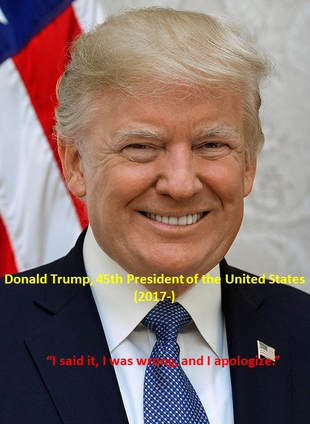
I have a West Point classmate who wrote a book to explain why he voted for Donald Trump. I read the book to try to understand the point of view of Trump supporters. I also listened to a number of other friends--staunch Republicans--who also voted for Trump. The best argument in support of President Trump from these people is this: (1) our government is a mired bureaucracy in need of a disruptive change agent who is an outsider to the political process to reform it, and to make America great again. (2) Donald Trump is a disruptive change agent who is an outsider to the political process and will reform it. (3) Therefore, we should vote for and support President Trump. (4) Any opposition to President Trump is a manifestation of the entrenched bureaucracy and not an accurate reflection of Trump's flaws. While I accept the first premise, I cannot accept any of the others.
On the other side of the ledger--the side of those of us who find President Trump to be unfit for the office of President--I find the most problematic character flaw of our current President is his constant attack on the free press and his use of the bully pulpit to broadcast propaganda and falsehoods. The Washington Post reported in November, 2017, that President Trump had made 1,628 false or misleading statements over a period of 298 days. In response, Trump and his supporters simply claim any news they do not like is "fake news," and have labelled legitimate media outlets as "enemies of the people." However, there are time-tested standards for determining what is true and what is false, and these standards show that Trump and his supporters are wrong. The Washington Post is a credible newspaper. It is not the National Enquirer. The difference between the two is simple: the Washington Post follows the time-tested standards for establishing what is true and what is false--and the National Enquirer does not follow those standards.
We at accountabilitycitizenship.org will continue to explore and explain the correspondence theory of truth and the coherence theory of truth in upcoming blogs, as we have in past blogs. We will explore and explain Occam's Razor, ad hoc hypotheses, and the notion of predictability. With these tools, and a commitment to diversify your sources of information, you can establish for yourself what is true and what is fake news. This is an essential skill, and it starts with your commitment to diversify your sources of information.
I close with this thought--whether or not you or President Trump likes a statement or premise has nothing to do with whether that statement or premise is true. Take, for instance, the assertion that, at one atmosphere of pressure, water will turn to ice at 32 degrees Fahrenheit. You may hate that, and you may rant and rave about how it is "fake news." But I will still be able to take a jar of water, put it at one atmosphere of pressure and 32 degrees Fahrenheit, and it WILL turn to ice. I can predict that it will do so tomorrow as well, and then repeat the experiment with the same predictable result. While not all matters will be as clear as proving a scientific fact, this simple example shows how you can use principles of correspondence, coherence, predictability and simplicity--we will explore these ideas in greater detail in the days ahead.
The US intelligence community published an unclassified assessment in January of 2017 that asserted Russia made a major strategic effort to disrupt the 2016 election in the United States. The Special Counsel's investigation has since confirmed that to be true, indicting 13 Russians for their role in that effort. Furthermore, numerous members of the Trump campaign staff, up to and including one of Trump's campaign managers, have been indicted or have plead guilty to charges of lying about the campaign's communications and contacts with Russia during the election and during the transition period. One former Trump campaign staffer was convicted and sentenced to jail time this past week. There is clear evidence that the President has attempted to interfere with the investigation. So far, however, no public evidence establishes a direct connection between the president and the efforts of his indicted staff members. But if Donald Trump were working to help the Russians disrupt the next American election, one of the most important things he could do would be to undermine the faith of the American people in their free press--their sources of information. And that is exactly what he seems to be doing.
"Were it left to me to decide whether we should have a government without newspapers, or newspapers without a government, I should not hesitate a moment to prefer the latter. " Thomas Jefferson

 RSS Feed
RSS Feed
